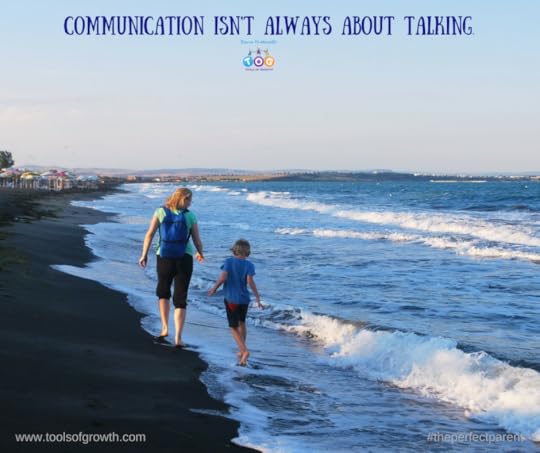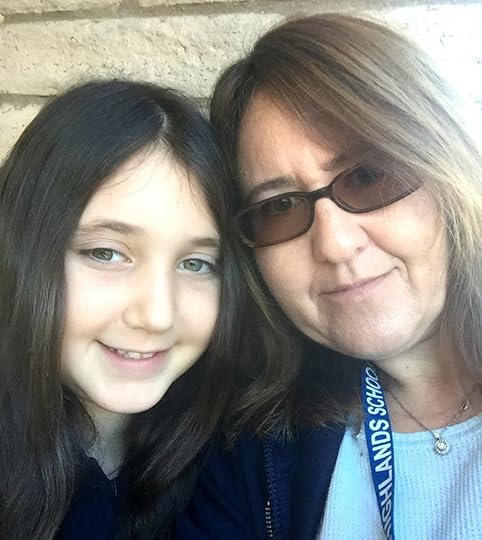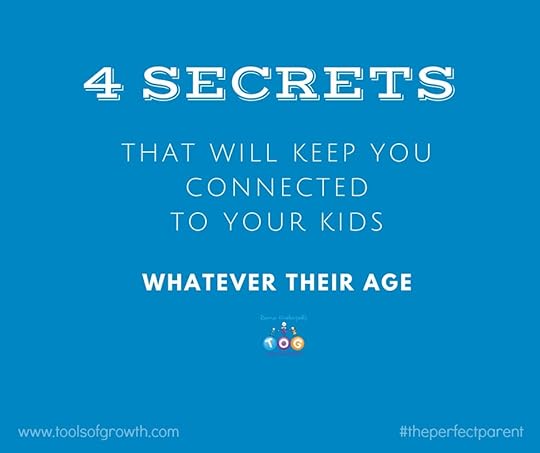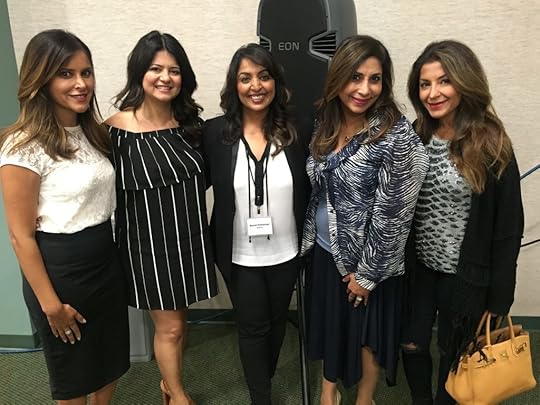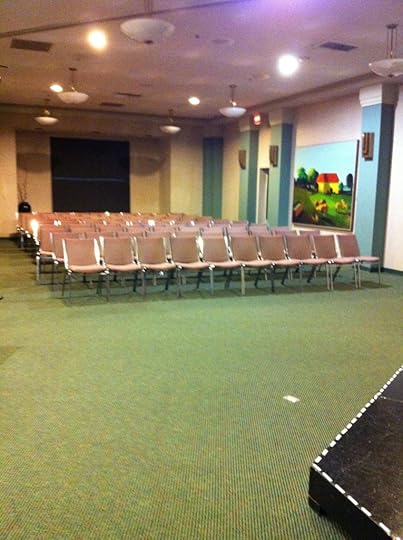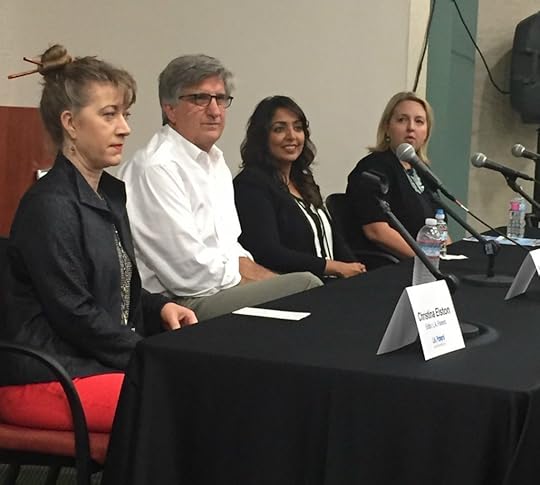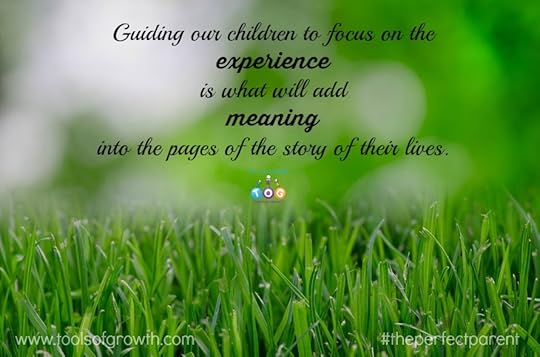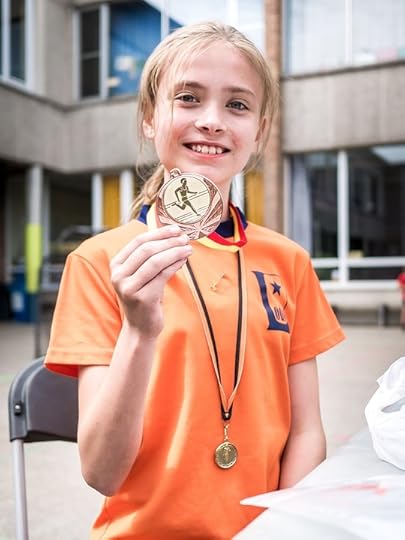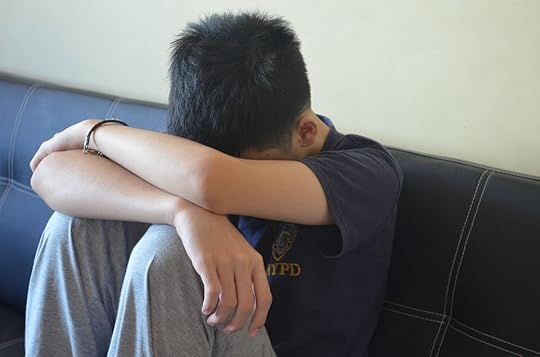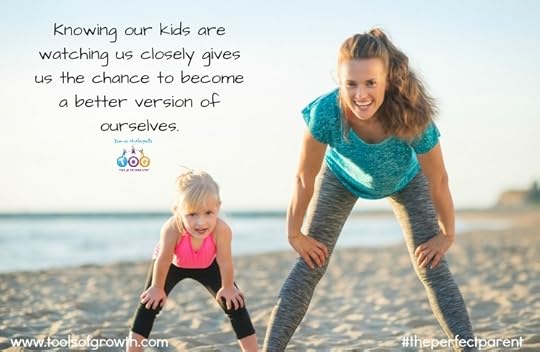Roma Khetarpal's Blog, page 18
October 4, 2016
Communication Isn’t Always About Talking
I wanted to share an email I received from one of my dear friends and a TOG parent, Carolyn West. We often strive to make our children’s childhoods so full of… full of activities, full of travel, full of experiences. In reality, our kids’ lives are full because they have us to listen to them, to share their interests, and to give them a hug when they need it. Just being close to each other is sometimes enough.
Dear Roma,
I thought you would appreciate this little incident that happened yesterday. My youngest was home from school due to parent/teacher conferences. Of course, even though she had the day off, I still had work to do and unfortunately, I wasn’t really able to take the entire day off to spend with her. As I worked on my laptop, she sat beside me most of the day and watched YouTube videos. I offered to take her out to lunch, but she said she’d rather us go pick something up and bring it home so we could have lunch with my other daughter who generally comes home from high school for lunch most days. So that’s what we did. Later in the afternoon, she looked over at me and said, “Thank you, Mommy.”
“Thank you for what?” I said.
“Thank you for the great day.”
“But we didn’t do anything today, honey. Was it a great day just because we got to spend time together?” I asked her.
“Yep. I love spending time with you.”
It’s so true. We don’t have to go out and make a big production of the day. We can just sit quietly side by side doing our own thing. My daughter just wanted to be near me and be able to show me a video or tell me a story. Sometimes that really is all they want… these crazy kids of ours.
Thought this was worth sharing.
Carolyn
If you are looking for some easy ways to connect with your kids, try the Take 5 approach. For five minutes, pause every errand, every to-do task, every recurring thought, and just hang out with your child doing no-thing! Just be present with your kids, open, aware, and relaxed in each other’s company. Hold hands, stare into nature, look at trees, flowers, or the sky, and really feel the shared space in quiet, with no agenda.
Carolyn West is a blogger at This Talk Ain’t Cheap and runs the ConnectHER Media Conference. Follow her on Facebook, Twitter, Instagram and Pinterest.
Carolyn and Lauryn
The post Communication Isn’t Always About Talking appeared first on Tools of Growth.
September 27, 2016
When Our Intentions Differ From and Our Kids’ Perceptions
As parents, we don’t always say what we mean, but we always have our children’s best interest at heart. This post was first published on Masalamommas.com .
Parenting can sometimes be a struggle between what our true intentions are in raising our children and the perceptions they come away with. While we always hope they understand what we try to tell them, often our actions—the way we live our lives—send an unintended message.
Recently, a mom in one of my parenting workshops called to tell me about a conversation she had had with her daughter, one that may be familiar to anyone with South Asian roots. This is what she said:
“My daughter was away at graduate school and had been elected co-president of the student council. Her male counterpart happened to be Jewish, and the pair became good friends, but this boy soon wanted the relationship to become something more romantic. My daughter was in a quandary; when she came home over winter break, she said, ‘Mom, what should I tell him? I don’t want to play around. I know I want to marry an Indian man and I know my family wants that for me too.”
“I was really surprised, and she could tell that by the confused look on my face. So she asked me, ‘Isn’t that what you and dad want for me as well?’”
The mother was completely taken aback, since they had never expressed that to their daughter. Yes, the parents themselves practiced the religion and traditions of her parents and grandparents, but they never intended those to rule their daughter’s life, too. In fact, she thought they had always been very open about the traits that were most important in their family:
Character first.
Family values second.
Culture, race, and religion third.
Before anything else, they had always believed, a person needed to have a great character. How a man conducts himself in his relationships, interactions, and challenges and how he models respect is what mattered most to them. That was what created the foundation of a relationship. Family values came next: What type of family would he raise? Would his morals and ethics align with those that they had raised her daughter with. Culture, race and religion could be important—if they mattered to the kids—but certainly not as important as the first two.
The woman reiterated all this to her daughter, then asked what gave the impression that her family wanted her to marry an Indian man? It turned out that the parents’ traditional lifestyle carried more weight than their words and intentions. Watching how her mother led her life made the daughter feel that she was expected to do the same.
Even though her parents never set that expectation for their daughter, by simply being brought up in the environment of the culture, tradition, and religion, the young woman got the impression that that’s what she should do and that’s what would make her family happy.
Who we are and the way we live is the biggest influence on our children. It may confuse them when we live one way, yet talk openly about them being able to choose a partner who might be outside of our culture. So what else could the parents have done to avoid such a disconnect?
Keep the dialogue ongoing.
Be open to discussions.
And the most important thing is to say—and keep saying—that even though children see the way we live in our household, we respect their ability to make their own choices and lead their own lives. The clearer we make this to our kids, the less the emotional load of expectations they will burden themselves with.
In this melting pot that we live in, most of our children are first-generation Americans. It is somewhat confusing for them—as was the case with the example above—of what we want from them and for them. One thing holds true for most of us though: We certainly don’t want to raise our children with the expectation that they will lead their lives exactly as we have done. Where’s the growth, the progress, or the evolution in that?
After all, didn’t we raise our children differently than the way our parents raised us?
Truly, the biggest gift we can give our children is to make communication a priority and keep the dialogue open. It is through open and effective communication that we can bridge gaps between our intentions and their perceptions. It is through effective communication that we set our children free to be who they are and live as they please, and to understand that we will stand behind them regardless of which race, color, or religion their spouse is.
The post When Our Intentions Differ From and Our Kids’ Perceptions appeared first on Tools of Growth.
September 20, 2016
Flaunting Can Be Daunting
Can our emphasis on winning set our kids up for failure?
We live in a society where parents tend to brag a lot. We brag about their awards, the number of activities they are involved in, the touchdowns they made, their exceptional SAT scores, the new gadgets they possess. We even brag about how much homework they have! We flaunt all this in public because we are proud of accomplishments. But what does this outward show of pride end up doing to our children and our community?
When we continually play up the wins, what we are really saying to our kids is that our standards are so high that we expect them to come out on top time after time. Unknowingly, we are also putting pressure on them to set their own standards high —sometimes impossibly high. By sharing these wins so publicly, we are unwittingly saying to them that we always expect the trophy or the 4.0.
It might be a rude awakening to find out that we are contributing to the rise in:
early childhood depression—which alters brain development
teenage anxiety—which contributes to mood disorders
stress in college students—which affects their mental and physical well being
So what can we do to stop our flaunting from becoming daunting? Here are three of the most common situations where we can learn to keep our bragging in check and avoid contributing to greater depression, anxiety, competition, and stress.
Winning Awards
Winning is great, it feels good, and we want to celebrate it. But we can’t possibly always win! Shouldn’t we be celebrating the experience just as much as the trophy? (link to experience post). How do we do that? First, be empathetic. Keep in mind that while our children might have won a contest, other kids didn’t. Don’t cross the fine line between sharing and bragging. Check in with your intentions. These are golden opportunities to teach our kids that hard work is its own reward, and we can be proud of everyone who did their best.
Overscheduling Sports & Activities
We talk a lot about life being a balance. For a concrete example, help your kids balance academics and extracurricular activities. Instead of signing them up for two or three activities, sign them up for one that they can concentrate on. The less they do, the more focused they will be on what they do and will be more committed to it. Remember that “less is more” when it comes to bragging about how many activities one’s child is involved in. It also helps shift the focus to where it belongs—on our children’s sanity and our family sanity.
Possessions
This is a tough one because we all want to share our new possessions. However, sharing is often misunderstood as bragging, especially by children. We need to teach our children empathy and keep them mindful about not flaunting new possessions in front of those who cannot afford them. Role-play with your kids about how anxious they felt when a friend had something that they really wanted but couldn’t have just then. This type of mindful parenting helps children dial into the most important part of life—the human connection—and keeps both flaunting and anxiety at bay.
Raising children who are not defined by their achievements, busy schedules, or possessions starts with us—the parents. When we are proud, we should always temper our emotions and not convey to our kids that coming out on top is everything. Be sure that your emphasis on winning is not setting your children up for failure.
The post Flaunting Can Be Daunting appeared first on Tools of Growth.
September 13, 2016
4 Secrets That Will Keep You Connected to Your Kids Whatever Their Age
One of the most common concerns I get from parents is, “Sometimes I feel disconnected from my child,” We tend to blame it on growth stages and phases—terrible twos, teenage years, hormones, whatever. The truth is we all want to develop a strong bond that lasts through adulthood, but, more often than not, life happens, and we end up focusing on getting through the day rather than nourishing what is in front of us. We get stuck on the doing of chores, completing to-do lists, and monitoring and chauffeuring our children.
So are there secrets to staying connected to your kids at every age while in the midst of the doing? Yes! Here are 4 surefire ways:
Always listen. There is a big difference between hearing and listening. Hearing is when we pay attention to the sound; listening is when we pay attention to the sound and the source. Our kids don’t always need us to solve their problems for them. Sometimes they just need us to be there while they talk the situation through and resolve their own conflicts. So allow your kids to complete their sentences and stories uninterrupted. If you feel the urge to jump in, respond with, “Ok, I see, uh-huh, really,” or substitute words that allow them to complete their thoughts. Sometimes, all they are looking for is someone to listen. When we listen to them about the small things, they will know they can always come to us for the big things.
Always show respect. We throw around the word respect very casually, but respect means understanding our kids’ own emotions and personalities. We must stop comparing our kids to their neighbors, siblings, or peers. Most importantly, we should stop comparing our children to ourselves. Conflict sets in when we see our children differ from us. It jars our vision and tips our expectations of our children—setting up disappointment and frustration for everyone. Respect means understanding that we are all individuals with our own ways of learning and relating. For example, I might be a visual person and love handwriting and scheduling my day in a paper planner. My child might be more organized on a computer or like to take notes on an iPad. We should respect our kids enough to appreciate how they differ from us and give them the room to discover what works best for them. That’s true respect!
Always start with a “yes” to any request. We say the word “no” a lot, don’t we? What if we turned the tables and started saying, “yes” first. Instead of saying, “No, honey, we can’t go to the movies today, maybe we’ll go this weekend,” we can say, “Yes, honey, that sounds like a great movie. Let’s plan on doing that this weekend.” When we lead with the “no,” our kids rarely hear what comes after. We are prewired to shut down when we hear the negative. How would you feel if you heard, “No, you can’t go the party. You have too much homework,” rather than, “Yes, the party sounds fun. Finish up your homework so you can go.” The second is so much better, right? So let’s always lead with “yes.”
Always have good food around. Food is the great unifier. It’s the way to everyone’s heart! Every culture celebrates with special dishes. All of us remember favorite foods that our parents and grandparents made. However, today, we find it challenging to keep up traditions of dinnertime as a family, celebrating a meal with each other. Passing down family food traditions to our kids is an important way to forge a long-lasting bond and build our relationship with them. Let your children help out in the kitchen when they are young. Teach them about healthy eating and foster those eating habits. Kids learn best by imitation, and that applies to our philosophy about food as well. If we show them a healthy lifestyle, they will most likely follow in our footsteps. When our kids become adults, they will look forward to a home-cooked meal and pass on that tradition to their own kids. My adult son recently told me that one of the reasons he loves coming home is because there is always food here. “Your food always puts me in a good mood,” he said.
Yes, these secrets to staying connected could seem like a lot of work and effort at the front end. But I reassure you the benefits in the long run will be priceless. They will help you build relationships and stay connected with your kids at any stage and at every age.
In Joy!
The post 4 Secrets That Will Keep You Connected to Your Kids Whatever Their Age appeared first on Tools of Growth.
September 11, 2016
Remembering 9-11 – A Legacy of Lessons
This is a day that will forever be marked in our minds. 9-11-01 left us with visuals of sadness, anger, empathy, and yes, perhaps even hatred for those that contributed to this horrific disaster. These are not the visuals we want our children to inherit. While we know the importance of keeping those images fresh in our adult memories, we can plant a victorious memory, a legacy of the lessons we have learnt from this tragedy.
1. Perseverance – humans have an amazing capacity to bounce back from setbacks. We are resilient if we stand together. We must teach our kids that when we all look out for each other, we can overcome the tough times. Standing by our friends and being supportive can help them bounce back.
2. Compassion – show compassion for those that are in pain – friends at school who are going thru divorce or illness. Reach out with “How can I help you?” or “I’m here if you need a friend.” These simple acts can teach our kids to offer what really matters, an ear to listen and a shoulder to cry on. The seeds for world compassion are planted in our very homes.
3. Support – help your kids show support by donating their time and/or a small amount of money to a local or national charity. Have them choose an organization that is meaningful to them and help them learn about their efforts. If they are older, they can organize a volunteer event in their community. When we inspire kids to get involved, we’ll raise adults who want to get involved.
Through trying times, we can teach our children empathy and help build their character.
The post Remembering 9-11 – A Legacy of Lessons appeared first on Tools of Growth.
September 6, 2016
When Life Comes Full Circle
Last week I participated in the first of an ongoing parenting series called “Connections: Conversations with Parenting Experts.” This event was sponsored by L.A. Parent Magazine and was held at the Beverly Hills Library. Upon walking into the venue I had a flashback that took me by surprise.
Back in February 2011, I had been studying mindful parenting for a few years and was looking for a location to hold a parenting class. I had a group of dedicated mothers who thought that I should share my research and my personal philosophy and had urged me on. One of the women suggested using a meeting room at the Beverly Hills Library. We looked at a few of the spaces there; one of them was rather large. It was more of an auditorium. I saw the expansive space and said that it would be perfect. I was joking; the room sat 150 people and had a stage!
Kamila, one of the parents, said to me, “Don’t laugh. You don’t realize it, but you will be in this room one day. You are that good, you just don’t know it yet.”
I thanked her for her encouragement, gave her a hug, and told her I was going to take a picture and put it on my vision board. This is the photo of that room on February 8, 2011.
We did end up holding my first parenting workshop at the Beverly Hills Library. And I went on to hold many more sessions there as I wrote The “Perfect” Parent and continued to teach about mindfulness to families and educators.
When I received an invitation from L.A. Parent to speak at this event, they said it would be held in the library auditorium, and I knew exactly what room they meant. What Kamila said to me all those years ago had come to pass.
In fact, the evening became a full-circle experience for me. Most of the parents from that first workshop showed up, and in another surprise both my kids were there. They didn’t need to be come, but they wanted to support me. My daughter, Nitasha, brought her camera, and my son, Navin, came with a snack for me. What a role reversal! My kids were doing for me exactly what I had done for them while they were growing up—taking photos and bringing me snacks. Life truly had come full circle!
Aside from my wonderful kids and my fabulous first-workshop parents, I want to thank my fellow panelists, Pat Levitt, Ph.D., of Children’s Hospital Los Angeles and Dawn A. Kurtz, Ph.D. of LAUP. Their knowledge and expertise and my take on mindful parenting was woven together seamlessly for our engaged audience, and I’m grateful to Christina Elston, our talented moderator, and Elena Epstein of L.A. Parent Magazine for the invitation to speak.
Thank you also to City of Beverly Hills for its PR coverage on the event and to the Beverly Hills Public Library for hosting us. What a great place to start this speaker series.
The post When Life Comes Full Circle appeared first on Tools of Growth.
August 31, 2016
The Lessons of Aleppo – What Parents Pass on to Their Kids
Aleppo, a city in Syria, has a population of 2.3 million people. Chances are that you had never heard of Aleppo until the media splashed a video of a five-year-old victim of the brutality the city faces each and every day. As parents, our hearts ache for this small boy who sat alone, covered in dust and blood. We wondered why no one was there to comfort him, and we wanted to hold this child to show him that there was still humanity in this world.
What is to become of him? What will he grow up to believe about a society that so cruelly took his family and left him alone in the cold? This is how it starts: A seed is planted for a life of revenge and bitterness. This boy’s childhood is gone forever, and we recognize that the anger and destruction in the world is caused by our inability to climb out of the darkness.
The tenets by which we live our lives are set in place at a young age. Our surroundings, our lifestyle, our parents all shape our personality, our beliefs, and, yes, our future. We are bound by our culture, our religion, and the land we occupy, and we become trapped in thinking that our reality is the best reality. But while we hold on tightly to what we think we know, we are also trapping our children, embedding our beliefs, impressions, and life into theirs.
We watch the news and read headlines in our comfortable homes, hardly able to fathom what is happening in Syria or Turkey. We can’t possibly leave our lives and our jobs to go there and help. So we wonder, what can we do to make a difference in the world? How can we make an impact and keep these tragedies from happening?
Here are four things we can do right now to contribute to a better world and specifically to the crisis in Syria.
Reevaluate our own beliefs. As parents, we all know that our children adopt our mind-set. We need to be honest and see whether we are carrying any seeds of discrimination ourselves. If we are prepared to change and grow our own beliefs, we can inspire our children to do the same. This is summed up clearly in a verse from The Translucent Revolution, How People Just Like You Are Waking Up and Changing the World: “Are we divided inside? If we are divided inside, there’s no way in heaven or hell that tomorrow we’re not going to have a divided world. It doesn’t matter if we’ve got the best of intentions in the universe; what really matters is the state from which we act.”
Our children inherit our internal state by osmosis. Being mindful of that can be the most important contribution we make toward a better world. We all carry forth into adulthood a little something that does not serve the world today, something clearly not worth passing along to our children. Know that every single time we soften our grip on a hurtful or false belief or opinion, we send a healing ripple into the ocean of life.
Open up a dialogue. Talk with your children, age appropriately, about the challenges our world faces, especially in the Middle East. Share with them how we are destroying each other in the name of religion and country. Educate them that this all stems from feelings of superiority and entitlement. Lead the discussion so they understand that we all have the right to live a good safe life and that no child, no human, should have to suffer at the hands of another.
Give of your time. Get out into your community and volunteer as a family. One of the most important things you can do is to plant the seed in your child’s mind that we are all one. Race and religion don’t matter when it comes to living in a peaceful world. We are all part of the human race. We never know which careers our kids will end up in, perhaps as part of the military or living overseas. Teach them early on that our similarities are more important that our differences. When we plant the seed of oneness in our children, it has the potential to unite the whole world.
Donate. If you are most comfortable giving a financial donation, there are many ways to do that.
Save the Children
International Committee of the Red Cross
Catholic Relief Services
UN Refugee Agency
UNICEF
Involve your children in this endeavor. Encourage them to contribute a few dollars from their allowance or piggy bank. Have them stand beside you as you make this contribution. Having them be part of the process will empower them to do so on their own in the future.
Mahatma Ghandi once said: “I am a Hindu. I am also a Muslim. I am also a Jew and a Christian. Some would even say I’m an atheist. Religion and the color of one’s skin—what useless ways to define and establish a nation!”
It is true that we have no control over our children’s fate or the adult choices that they will make. What we can control is the seed of love we plant in them and the soil of unity and oneness that we raise them with—right now.
The post The Lessons of Aleppo – What Parents Pass on to Their Kids appeared first on Tools of Growth.
August 23, 2016
Focus on the Experience, Not the Outcome
As adults, we are often so focused on the outcome of what we do that we tend to forget about the experience itself. Somehow, we are always looking for the payoff. For example: How much money are we going to make? Or will we win the prize?
Do we serve our children well when we do this? How about teaching them to experience the experience instead of focusing on the outcome? Would that not add more meaning to their lives? Here are some steps that you can take.
Positive Experiences
We all love a positive outcome, and we celebrate that as a society. If you work hard at something, you will be successful, right? We tell our kids that if they study hard and do all their homework, they will get a good grade. We push them to run faster and play harder so that they’ll hit a home run or score a touchdown.
When our kids experience a win, we are quick to show our excitement and hop onto social media to let everyone know. But the real prize lies elsewhere. We need to teach our kids that the experience of getting there is just as worthy as the trophy. In order to help them do this, ask your child these questions:
How did winning make you feel?
Were the steps you took easy or hard?
Did you have fun doing it?
What did you learn from this?
Negative Experiences
What happens when the outcome doesn’t match the goal? We should always start by validating their emotions with a tool from my book, The ‘Perfect’ Parent called Dealing with the Feeling—spot it, say it, okay it, and then ask these questions:
How does not winning make you feel?
Do you think you tried your best?
Did you have fun playing?
What did you learn from this?
Feeling angry or sad is completely normal, and it’s okay to express those emotions in a safe way. Saying things like, “Snap out of it,” or “Toughen up,” is condescending and discounts your kids’ feelings. Let your child take a break and just sit with the feeling for a while. In Jill Bolte Taylor’s book, A Brain Scientist’s Personal Journey, she explains:
Once triggered, the chemical released by my brain surges through my body and I have a physiological experience. Within 90 seconds from the initial trigger, the chemical component of my anger has completely dissipated from my blood and my automatic response is over. If, however, I remain angry after those 90 seconds have passed, then it is because I have chosen to let that circuit continue to run.
When we allow our children to work through their own emotions, they will learn how to self-manage those negative feelings. Let them experience the experience.
Neutral Experiences
How many times have your kids not really cared what the outcome of a game was? Perhaps they were bored or the activity wasn’t exciting enough for them. There’s nothing wrong in having neutral experiences. We are so over-stimulated and over-scheduled these days that we don’t allow our children enough time to just be. But something wonderful comes from being in a state of boredom. In fact, it’s necessary for all of us to take a No-Thing break every day.
We may be afraid to feel nothing, but nothingness is where our greatest creativity comes from. It’s where we get new ideas and learn about ourselves on a deeper level. If your children are complaining that they have nothing to do or are “bored,” let them work through that experience as well.
The ocean of life is navigated through the waves of experiences—positive, negative, and neutral. Riding these waves is the life lesson. Experiencing the experiences is what makes our life robust and gratifying. As John Keats said, “Nothing ever becomes real until it is experienced.” Guiding our children to focus on the experience is what will put meaning into the pages of the story of their lives.
The post Focus on the Experience, Not the Outcome appeared first on Tools of Growth.
August 16, 2016
Three Ways to Bring the Olympic Spirit Home to Your Kids
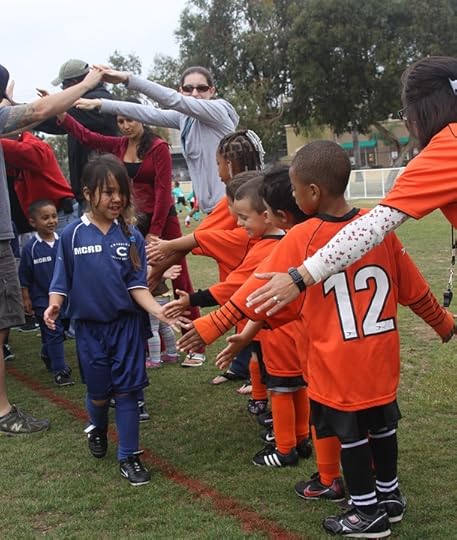 Have you been tuned into the Olympics over the past week? I have been watching and cheering on our USA team, as well as rooting for all the athletes in the games, hoping they will all do their very best. This is a great opportunity to sit with your kids and share some of the valuable lessons the Olympics can teach us.
Have you been tuned into the Olympics over the past week? I have been watching and cheering on our USA team, as well as rooting for all the athletes in the games, hoping they will all do their very best. This is a great opportunity to sit with your kids and share some of the valuable lessons the Olympics can teach us.
From all corners of our world, the best of the best come together to compete for gold, silver and bronze medals. And while there are always first-, second- and third-place winners, there are no losers at the games… because just being able to participate is a huge win. Athletes have trained for years, some for their entire lives, to earn their place in history. What an incredible accomplishment!
In the International Olympic Committee official Code of Ethics, the first item reminds us of:
1.1 Respect for the Olympic spirit, which requires mutual understanding with a spirit of friendship, solidarity and fair play
Regardless of political affiliation, nationality, or gender, the underlying philosophy is that we’re all in this together. Shouldn’t this be the exact same concept behind every sporting event, not just the Olympics? Unfortunately, we’ve all been at games where parents were yelling at coaches, yelling at kids, shaming other players, and spreading the blame.
Instead of condoning that behavior, here are three things we can all learn from the Olympic Code of Ethics:
Be a good role model for your kids:
Parents, don’t pout or heckle each other during your child’s game or event. Too often, parents become negative—about their own child, teammates, or competitors. Stop the grousing and focus on the positive. Be a true “team” parent, and support all the kids participating. That means rooting for your child, the team, and the sport itself, including the opponents.
Build character, camaraderie, and motivation:
When your child or the team loses, encourage all participants to keep their dignity. Remind them to shake hands and say, “Good game.” This builds character and camaraderie and encourages kids to be motivated to work harder next time.
Teach your kids to be good sports:
Talk to your kids about losing, and explain that just because they lost a game, match, or meet, it doesn’t mean that they failed. They should be proud of the fact they had the chance to compete and learn from the other players and teams how they can do better next time. This is what good sportsmanship is all about.
We put so much pressure on our kids to be the best that we sometimes forget the most valuable lessons: how to be good sports, that character counts, and that they should be respectful to others.
While we love to see our own team win, we can certainly always respect and be awed by the accomplishments of others. Bring the Olympic spirit home to your kids!
The post Three Ways to Bring the Olympic Spirit Home to Your Kids appeared first on Tools of Growth.
August 9, 2016
Our Best Selves… But Better!
When my daughter, Nitasha, was just starting elementary school, she came to me one day and said, “Mommy, I want to grow up to be just like you.”
The question caught me off guard, and I asked her, “Why?”
“Because you’re smart, you’re kind, and you’re pretty, “ she answered, looking up at me with her big smiling eyes.
The voice inside my head said, “Really? I don’t think so. If only you knew! Yesterday, I screamed at your dad during a disagreement. Last week, I called your teacher a name—in my mind—when she said that you weren’t B-grade material in math. I’ve called in sick to work so I could attend your brother’s graduation, and I’ve told other little white lies to those close to me!”
Of course our kids want to be just like us. From the time they are born, we are all they know. We are their everything. That’s great and makes us feel honored and proud. But they see us from the outside; only we know what we are like on the inside. Oftentimes, we probably feel we don’t quite fit the standard of what we want our kids to be.
And really, deep down we shouldn’t want our children to be carbon copies of us. What we want is for them to be their own best selves.
Alison Gopnick, author of The Philosophical Baby, has studied in depth the science of babies and children and how they develop their identity. From birth, she notes, kids’ sense of self is tied in with the primary caregiver: “We know that children’s conception of a continuous separate self develops slowly in the first five years.…And attachment research shows that babies develop a deep connection to a few particular, special, beloved caregivers.”
What does that mean? It means that we can use that opportunity to encourage our kids not to strive to be like us but to embrace their own selves and be the best them they can be.
How do we do that and why is it important?
Share and honor our similarities and differences. It’s important to share with our kids how we are similar and yet focus on what makes us different from each other. Celebrate the qualities they have that make them unique by encouraging a clear understanding of their individuality. This builds our children’s connection with themselves and helps them create a better understanding of their own strengths and weakness—grounding them with self-confidence and self-esteem.
Encourage self-exploration. Life is a process of self-discovery, and the first steps to that start with our direction and guidance. Allow children to explore their interests, likes, dislikes, and their higher vision of themselves. Let them find out if they love dance or music or sports without any expectations from us. Let them discover what they enjoy and what agitates them, triggers them, and motivates them. When we take the pressure off, we allow them to explore and get to know themselves. This helps them achieve self-understanding, resilience, motivation, and self-reliance.
We should also remember not to put pressure on ourselves to be the “perfect” role model. Kids will see it all—the good, the bad, and the ugly. Our job is to show them that there can be a balance. We all make mistakes; they will, too, and that is how we all learn and grow.
Of course, knowing our kids are watching closely, we also have the chance to become a better version of ourselves.
The post Our Best Selves… But Better! appeared first on Tools of Growth.

